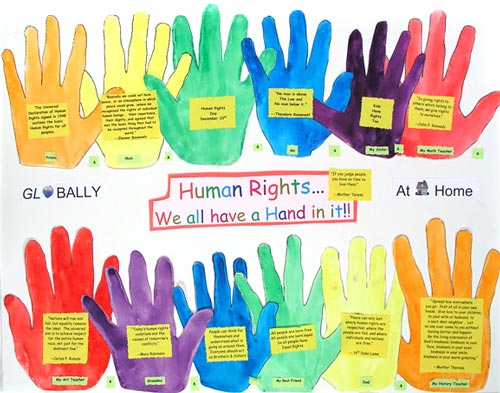Yes, There are Bad Guys
When the film "12 Years a Slave" came out, an adult friend of mine asked: "Should I watch it?"
Yes. It's an uncomfortable topic, and difficult to watch in places, but the history it covers deserves attention. Adults must participate in the world and not be sheltered. But what about the kids? What do we tell them about real-life horrors and "bad guys?"
I'm not alarmed by stranger danger, but I do believe children have a right to know that bad things do happen in the world. Human rights depend on it.
Enormous topics like slavery, the Holocaust, other genocide and human trafficking need to be talked about, and the talks need to start in the family. Kids deserve to come to terms with these parts of humanity gradually, at their own pace. But children - and human rights - are both given a disservice when we keep kids overly sheltered from knowledge about "bad guys" of the world.
Start with the Family Big topics need to start in the family. It's not fair to shelter kids for years and then have them learn about these horrors all at once in, say, 7th grade history class. Families offer emotional support, and families know individual kids' personalities best.
Make it Gradual It's not one big "Talk." Like honest and age appropriate talks about sex ed and human mortality, these discussions are on-going and organic. Little bits here. Little bits there. Start very small and add layers of information as the child grows.
Preschool is OK No, I don't suggest flooding your young child with distressing, advanced topics. Most Holocaust experts advise waiting until at least 8 or 9 - that anything before that age will only bring nightmares. Yet young kids who watch the "Sound of Music" can understand that the Nazis are bad guys. Young kids who learn about Moses in church or synagogue can learn what slavery is, and that people want to escape and be free. These are the simple foundations.
Focus on the helpers This is the same message as helping kids cope with disasters in the news. Look for stories about good people who helped in terrible situations. Kids ought to know that there are more good people than bad people in the world, and that, yes, they can be one of them.
Bring it up to date Kids deserve to know that terrible things are not just confined to history. Slavery is not over, as National Geographic pointed out to millions of readers. Today there are 21 million people enslaved around the world, more than at any time in history. Frame it as an opportunity - we can do something about it.
Take action together Kids' natural outrage at unfairness needs an outlet. Take action, and let your kids participate as you can. Send money to a human rights nonprofit. Start an anti-slavery group, part of Anti-Slavery International. Stand up for an injustice close to home. Support a group that is starting a new Underground Railway. Show your children there may be bad things in the world, but good people are trying to make it better.
Tackling difficult topics is part of parenting. Explain simple facts. Provide emotional support. Teach skills - including conflict mediation. Model positive actions. These are the whole world's problems, and only the whole world can fix them.
When did you first learn about some of the atrocities of history or current events? What helped you understand? How can we best teach our kids and not overwhelm them?
Ideas welcome - this topic is one of many new ones that will be covered in the upcoming sequel to It's OK Not to Share.
